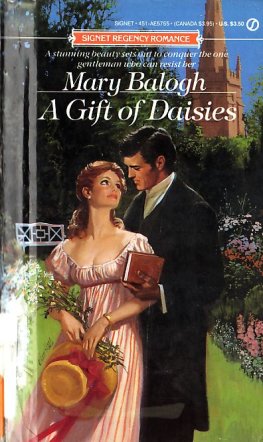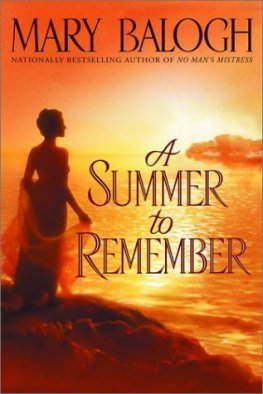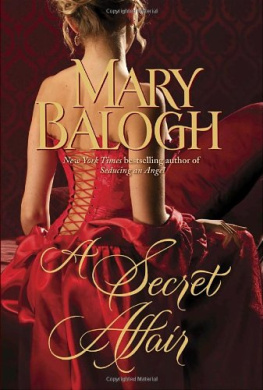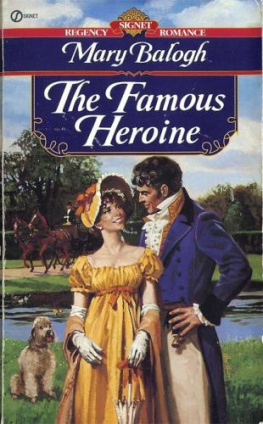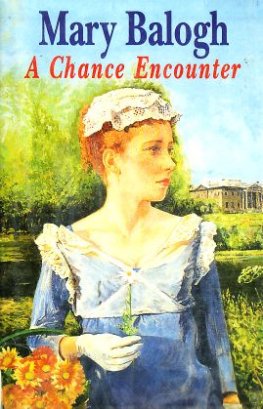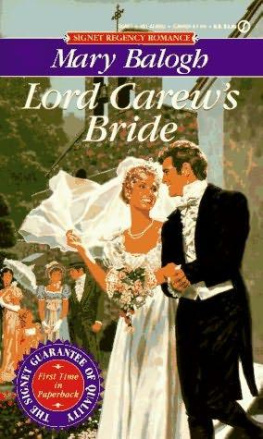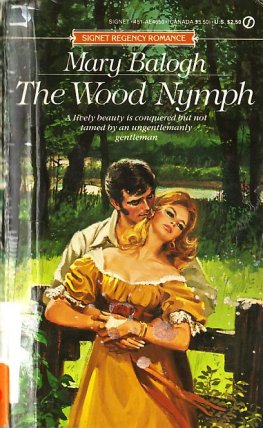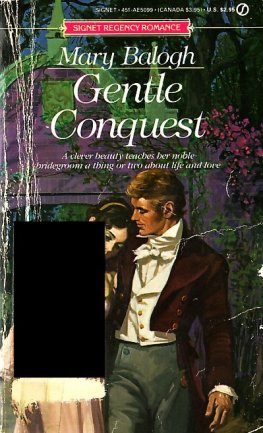Mary Balogh
A gift of daisies
The two young men walking along Bond Street were quite unremarkable, mingling as they were with the usual morning crowd of elegant shoppers and strollers. One was fashionably attired, from the tip of his beaver hat to the toes of his shiny black Hessian, boots. The other was plainly but neatly dressed. His height and splendid physique gave him an air of fashion, but a second glance would have revealed to an observer that both his coat and his boots had seen better days.
The latter young man was smiling at the other as they dodged a fashionable couple on the pavement. "Yes, Algie," he said, "I must confess that you are now the perfect gentleman down to the last little detail. Only one thing puzzles me. Why does high fashion require one to drag around all sorts of useless paraphernalia?"
Lord Rivers looked down at his newly purchased gold-topped walking cane. "It is rather splendid, is it not?" he said, thoroughly pleased with himself. "Do you think it will elevate me to the ranks of the Corinthians, David m'boy?"
"I doubt it," his cousin, David Gower, said with a laugh. "I think there are other qualifications of more importance."
"A damned shame, I would say," Lord Rivers commented without rancor. "But the cane does add years of consequence to a man, you must admit, David. A pity you would not let me buy you that turquoise-studded snuffbox. I can't stand the stuff myself, but it would give you a definite air."
"I don't think it would have quite fit my image," David said with a grin. "And you must learn, Algie, that I do not need you to be spending money on me. I have quite enough for my purposes. It is sufficient that you have invited me to stay here in London for a number of weeks before I remove to the country to rusticate forever after."
"Well, you can't blame a man for trying," Lord Rivers said with a sigh. "But you haven't become a killjoy, have you, David? You used not to be. You were up to all sorts of mischief as a lad. The despair of my aunt, I seem to remember."
"Poor Mama!" his companion agreed. "But no, Algie, I don't think you will find me turned into an old sobersides. You must remember, though, that it is four years since we last met. Very eventful years. I have changed."
"You must have," his cousin agreed fervently. "You actually studied at unversity, David? Amazing! I never heard of such a strange thing. And then refused Rufus' offer to send you on the Grand Tour. Now, that needs explanation."
"My brother has his family to think of-he doesn't need to worry about me," David said. "Papa did not leave the estate in a very prosperous way, you know, Algie. Rufus has the Cardwell title and little more. No, it was always understood that I must seek employment. I have done so. There is no point now in playing the grand gentleman and gallivanting off to the Continent. Besides, I would not have found the experience very pleasurable. A waste of time, rather."
"You have changed!" Lord Rivers said bluntly. "Only four years ago, David, when you were here with me, you were fretting at the cruel fate that had made you a younger son."
"And now I have learned to bless that same fate," his cousin said with a shrug. "People change, Algie. It is the difference between one-and-twenty years and five-and-twenty. Now I am not only contented but actively glad that I am the younger son of a not overly wealthy father and thus forced to seek my own way in life. And I am equally glad that Madeline has done her duty so promptly and presented Rufus with two sons so that I am far removed from all hopes of the title."
"If I didn't know you better, David, m'boy," Lord Rivers said, eyeing the other around sharply starched shirt points, "I would suspect sour grapes. But you always spoke what was on your mind Ah, well met!"
David followed his cousin's gaze to the doorway of a ladies' modiste, from which two young ladies were just emerging. One was extremely pretty, the other rather plain, his mind registered somewhat absently.
The pretty girl smiled brightly in their direction and raised a perfectly frivolous green parasol over her head. "Algie," she called, "how glad I am to see you. I was just saying to Celia how dreadfully lowering it was not to have a gentleman's escort along Bond Street to the milliner's. Do say you are not in a hurry. You are such an imposing figure that I am bound to be noticed if I am on your arm." She laughed gaily to dispel any impression of conceit that her words might have aroused.
"As if you needed my presence or any other man's in order to be noticed, Rache," Lord Rivers said, closing the gap that remained between the two small groups.
David Gower's attention was caught, and he looked with some curiosity at the pretty girl in green. This was the neighbor Algie had spoken of the day before. The Earl of Edgeley's daughter, up from the country for her come-out. He had spoken so warmly, in fact, about her beauty and her success with the ton that David had wondered if there were any more to their relationship.
"How d'ye do, Miss Barnes?" Lord Rivers was saying, lifting his hat to the plainer girl and bowing his head. "May I present my cousin, David Gower? Lady Rachel Palmer, David, and her friend Miss Celia Barnes."
Curtsies and bows occupied the next several moments. Lady Rachel was indeed a beauty, David noticed. Her cheeks were flushed becomingly and her dark eyes sparkled as she looked up at him. Her hair, in soft curls beneath an absurdly ornate little bonnet, was as rich a brown as her eyes. She had a light, trim little figure. She would have attracted him a few years before. He could well imagine that Algie might be nursing a tendre for her. He turned and smiled at Miss Barnes and made some commonplace remark as he bowed to her.
"Lord Cardwells brother?" Lady Rachel was asking. "Is Gower House open, sir? I did not know the family was in town."
David smiled. "I am Algie's guest for a few weeks," he said, "before we go into the country together."
The color in her cheeks deepened. "You are to go to Singleton Hall?" she asked. "We are returning home at the same time, you know. Are you to stay there long?"
"I did not make the introduction very clear, Rache," Algernon said apologetically. "I should have presented David as the Reverend David Gower. He is taking over the vacancy in the village church when Vicar Ferney retires at the end of next month. It is my living, y'know."
Lady Rachel was looking wide-eyed into David's face. "Oh," she said, and giggled. "I did not realize. I am so sorry. You do not look like a clergyman, you see."
David's eyes were twinkling. "Clergymen are not born sixty years old, stooped, gray-haired, and nearsighted, you know," he said. "I will have to earn those honors."
"Oh," she said, sounding somewhat disconcerted. She turned to Algernon. "Algie, you will be at the Simpson ball tonight? You really must. I have a new ball gown that is absolutely weighted down with the most exquisite Brussels lace. Is it not, Celia? I simply must be certain that everyone sees it and me. And no one waltzes as well as you. I shall sign your name next to the first waltz on my card to make sure that no one of inferior talents steals it. Shall I? And Celia has a divine blue silk that is like to blind all beholders when it catches the candlelight. I shall sign your name on her card for the second waltz. You will be there?"
"Rachel!" Celia admonished her in an undertone and an agony of embarrassment, looking anywhere but at either of the two young gentlemen.
"Perhaps I may have the first?" David said in an attempt to lessen the girl's mortification.
"Oh, and the second with me?" Lady Rachel asked. "Can you waltz, Mr. Gower?"
"Yes, actually," he assured her, "though nowhere is it taught as a requisite for holy orders, ma'am."

